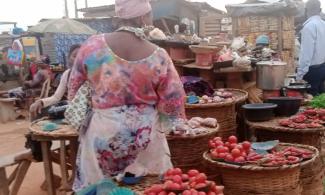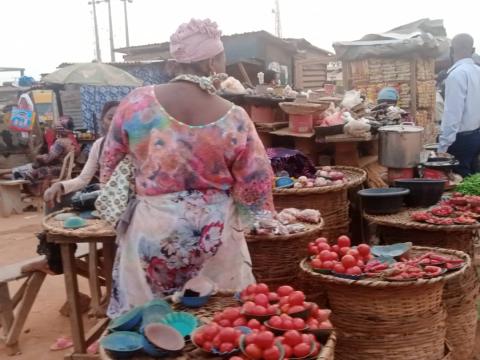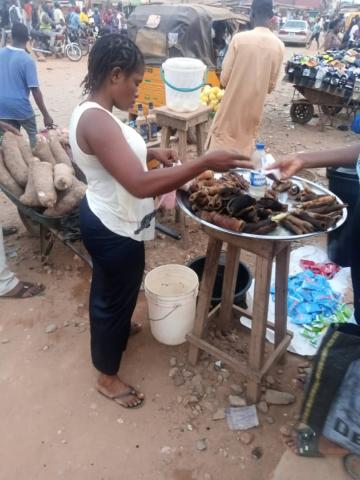
A yam dealer, Beatrice, said that the blockage had not only affected the cost of food items transported from the North but every other food item.
South-West states have started feeling the heat of the strike action embarked upon by members of the Amalgamated Union of Foodstuff and Cattle Dealers of Nigeria (AUFCDN) as prices of beef, food and vegetables in the markets have skyrocketed.
AUFCDN, which is an affiliate of the Nigerian Labour Congress (NLC), commenced a nationwide strike last Thursday following the expiration of a seven-day ultimatum given to the federal government to attend to its demands.

The union had demanded the protection of its members, payment of N475 billion compensation for lives of members and properties lost during the #EndSARS protest, and the Shasa market crisis in Ibadan.
It also demanded the dismantling of all roadblocks on federal highways where their members are harassed and money is extorted from them by the authorities.
The strike entails closing all routes between the North and South for vehicles conveying cattle and food items. Such vehicles are stopped from reaching the Southern region.
SaharaReporters gathered that there is over a 200 percent increase in the cost of food items in Lagos markets.
A yam dealer, Beatrice, said that the blockage had not only affected the cost of food items transported from the North but every other food item.

She said, “As you can see, I really don't have much stock here because they are not allowing the trucks to come into the South, so the ones we have here have become more expensive. This one (displaying a small tuber of yam) costs N700, nothing less. I am selling it at that price because it is from my old stock. I learnt the ones they manage to bring in now are very costly.
“The market is now very dry. Look in those directions (pointing to tomato sellers), you'll see that they are very unaffordable, we are even tired.”
A butcher at Kara Market, Akute told SaharaReporters that the market had been shut since Monday morning as there were no cows to kill. He stated that the abattoir has been shut since last Thursday and that the situation was affecting beef sellers and consumers in the area.
“I have a store at Kara market and this morning, when we got there, we realised it had been locked up. The trucks that bring in cows to the South are no more coming so there is really nothing to work with. The cows butchered last week were even few in number. That's the reason why food items are costly.
“There's no way you can go to the market now and anyone will sell beef of N500 or N1, 000 to you. Beef, in particular, is very very expensive. If anyone sells to you, check that meat very well, it's not a good one. Some people have already started buying fish, getting used to how to eat fish rather than meat. Some will start buying frozen chicken, turkey or even the fresh ones but you know, all these things will also be affected and their prices will also increase.”
Another market woman who sells cowhide (ponmo), while reacting to a question on why her wares were expensive, quipped, “Is Ponmo not a part of the cow?”

From her store and the stores of other ponmo dealers like her, the cowhides available ranged from N150 to N250. Asked why the usual N50 and N100 cowhides were not available, she said, “As it's affecting the real beef, that's the same way it's affecting ponmo. We usually buy a portion of ponmo (Owo kan) at N8, 000, that's for the big ones but now, we buy it at N12, 000. In this market, I am the only one selling ponmo of N150, go to other people, they sell for N250 and you will not get it cheaper.”
Truly, others sell at N250 for ones s SaharaReporters later found out.
SaharaReporters observed that pepper sellers were not left out. Four pieces of small tomatoes were sold at N100 while double of that went for N200.
A pepper seller said a basket of tomatoes sold for N7, 000 before the strike was now N25, 000. According to her, the price difference for Habanero pepper and red bell pepper is double that of tomato.
“For the one we are selling now, we all contributed money to buy a basket, then we shared it because it was too expensive and we didn't know what would happen later. A sack of habanero pepper that used to cost N8, 000 is now N35, 000, they even sell the rotten ones for as high as N18, 000 but who will buy rotten pepper from us? I'm talking of a small sack of pepper. People don't even understand what is happening yet, they come here and see that we are selling four pieces of tomatoes at N100, they angrily leave. We are also not happy with it.
“As I said earlier, four or five traders now buy a basket of tomatoes or pepper and share whereas before now, some of us would buy half a basket, but now, we can't even do that because we cannot afford it?”
The costs of other food items such as onion, smoked fish, and others are gradually increasing due to the strike.
A Hausa trader said onions had also become very expensive. He said he was selling six pieces of small onions for N100 while one medium-sized onion was sold at N50.
“Our people have decided to stop transporting food items to the South. As it's affecting you, it's also affecting me because I'm the trader and even though I make gain from here, the money will be expended on other things I don't sell but I have to buy,” the trader said.
In its reaction, the Southern and Middle Belt Leaders Forum warned the AUFCDN to desist from blocking the passage of food items and consider the consequences if the South is to do the same.
Speaking with SaharaReporters, the South-West representative and National Publicity Secretary for Afenifere, Yinka Odumakin said the forum will take a step very soon if the association does not call off the strike.
“They will hear from us very soon. They will hear from us if they continue their nonsense but our reaction will not be just for newspaper publication, they will surely hear from us,” he said.
He also described southerners as hard-working people who worked on farmlands before the invasion of killer herdsmen and their cattle on the farms.
“We have warned the bandits who are behaving like blockheads in the North that blocking tomatoes and food items is not the way to go. They had better stop the nonsense before we are forced to act. We are not lazy people, if not for the animals from their areas that destroyed our farms, we produce food too," he said.